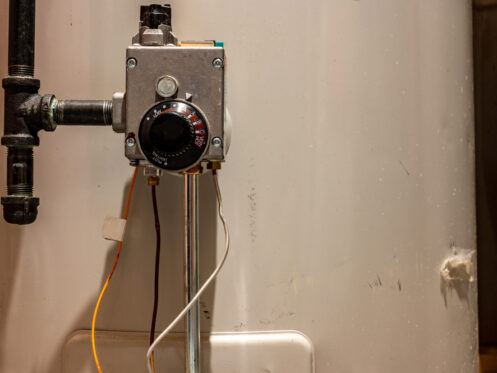If your showers feel a little too cold, your hands burn under the tap, or your dishes aren’t coming out as clean as they used to, your water heater temperature might be to blame. But finding the right setting isn’t just about comfort. It also affects your safety, energy efficiency, and appliance lifespan. We’ll break down what temperature your water heater should be set at to help keep your household safe and your water just right.
Safe Temperature Range for Hot Water Heaters
The ideal temperature for domestic hot water heaters is between 120°F and 140°F. Keeping your water heater within this range keeps your showers hot, your dishes clean, and your family safe. While the U.S. Department of Energy recommends keeping your water heater as close to 120°F as possible, the setting that’s best for your home will depend on several factors.
Home size
Larger homes often benefit from a slightly higher setting to compensate for heat loss as water travels through long pipes. Smaller households or those with only a few residents who use hot water can typically keep the temperature closer to 120°F without any issues.
Water usage
If you live in a busy household with multiple showers, appliances, and a high demand for hot water, setting your water heater to between 130°F and 140°F can help prevent your water from turning cold mid-use. You may also want to consider opting for a tankless water heater for endless hot water without the limitations of a storage tank. On the other hand, if your hot water usage is relatively low, keeping it at 120°F helps you save energy and reduce the risk of scalding.
Household members
Keeping your family safe is always a top priority. If you live in a home with children, the elderly, or those with sensitive skin, setting your water heater to 120°F helps prevent the risk of burns. However, if you live with someone with a compromised immune system, a higher temperature of 130°F to 140°F may be best to protect against bacteria growth. If you opt for higher temperatures, consider installing an anti-scald device for added protection.
Risks of Setting the Water Heater Temperature Too High
It’s never a good idea to let your water heater temperature reach over 140°F. Temperatures this high can put you at risk of:
- Scalding accidents: Setting your water heater temperature too high can result in painful, scalding water coming out of your taps. Water over 140°F can cause burns in just a few seconds, putting children and the elderly especially at risk.
- Pressure buildup: High temperatures increase the chance of pressure buildup, which can lead to costly and damaging explosions.
- Increased wear and tear: Higher temperatures cause your water heater to work harder. You’ll see faster wear and tear, higher energy bills, and a shorter lifespan.
Issues With Setting the Water Heater Temperature Too Low
Much like high temperatures, setting your water heater too low comes with its own set of risks, including:
- Bacteria growth: Temperatures between 77°F and 108°F create ideal breeding grounds for Legionella bacteria, posing a serious health risk.
- Buildup: If your water isn’t hot enough, soap and detergents won’t work as well, leading to soap scum and residue in sinks, tubs, and dishwashers.
- Uncomfortable conditions: Low water temperature can cause cold showers, lengthy dishwashing sessions, and laundry that doesn’t feel quite as clean after a wash.
Adjusting the Water Heater Temperature
You can adjust your water heater temperature at home by following a few simple steps:
- Turn off the power: If you have an electric water heater, switch off the breaker. If you have a gas water heater, turn the gas control knob to “pilot.”
- Locate the thermostat: The thermostat is often hidden behind a small panel or near the bottom of the unit. Find it and mark the current temperature.
- Adjust the temperature: Turn the dial or manually adjust the temperature to your preferred setting.
- Test the water: After a few hours, run hot water from a faucet to see if the temperature is where you’d like it to be. If necessary, adjust the thermostat again until it’s correct.
Issues With Your Hot Water Heater? Contact the Plumbing Professionals at High 5!
Keep your water at the perfect temperature with help from High 5 Plumbing. Whether you need help adjusting the thermostat, fixing a malfunctioning unit, or are due for routine maintenance, our team is here to help! We offer comprehensive water heater services in the Greater Denver Metro Area to keep your home comfortable, efficient, and cost-effective. Call us to schedule service today.
Frequently Asked Questions
Should I set my water heater temperature higher in the winter?
You often won’t need to adjust your water heater temperature in the winter. If you live in an area with long, frigid winters, you can turn it up slightly to account for the heat loss as it travels through colder pipes.
I adjusted my water heater temperature, but it feels the same. What should I do?
If you adjust your water heater and don’t notice a difference, give it a few hours for the temperature to regulate. If nothing changes, contact our team to schedule an inspection. There might be a problem with the thermostat, heating element, or other component that requires repair..
How often do I need to schedule water heater maintenance?
Scheduling water heater maintenance at least once yearly helps keep your system running in top condition. With routine maintenance, you’ll see a longer system lifespan, improved energy efficiency, and fewer repairs.

